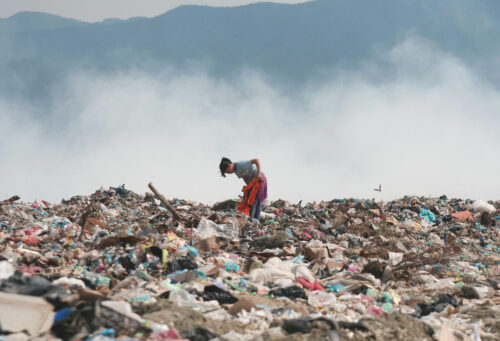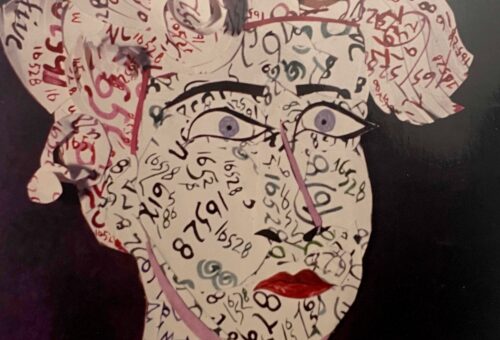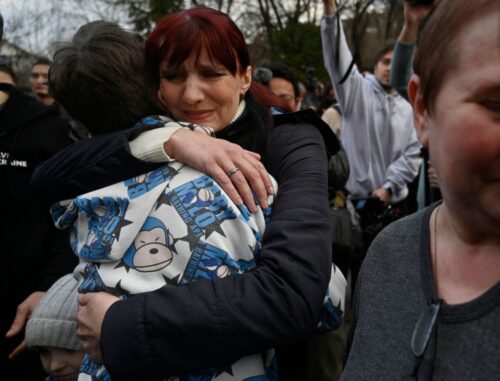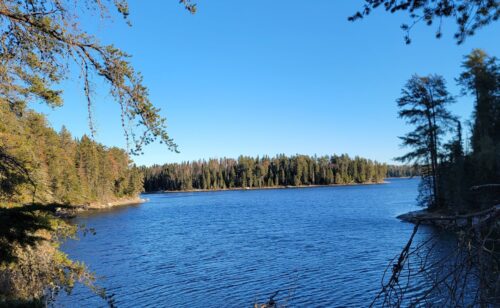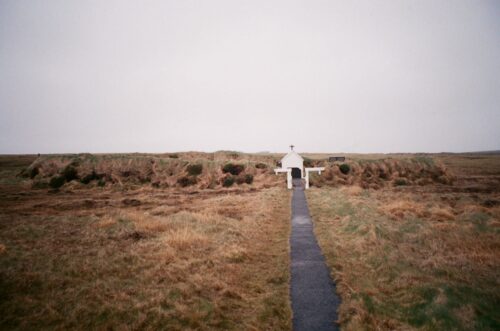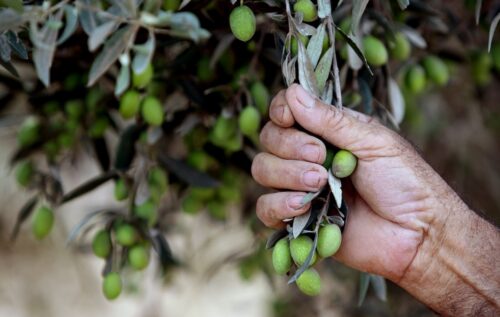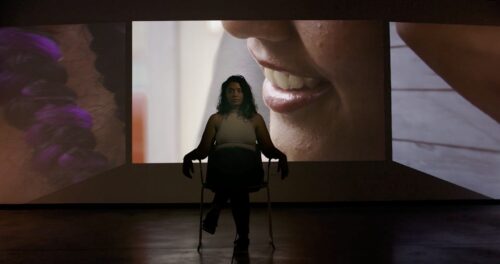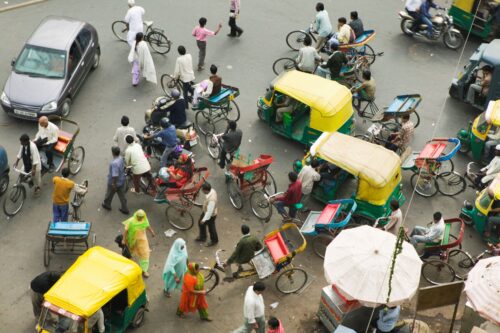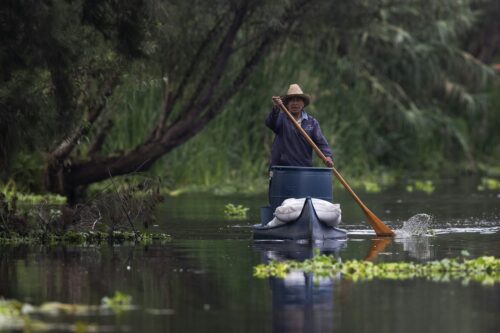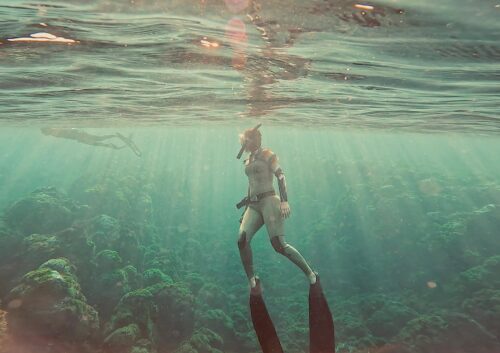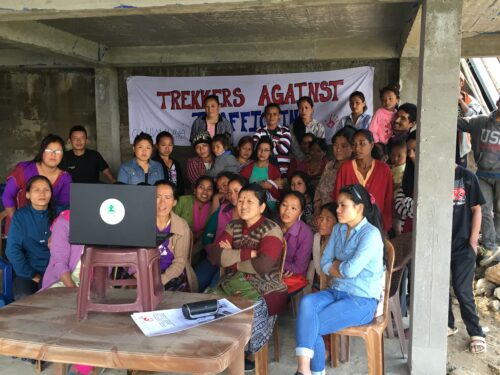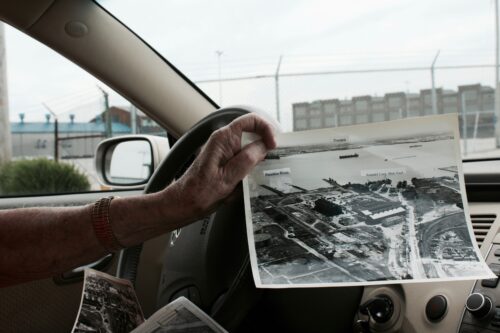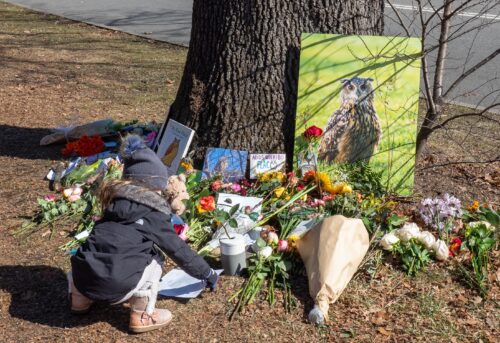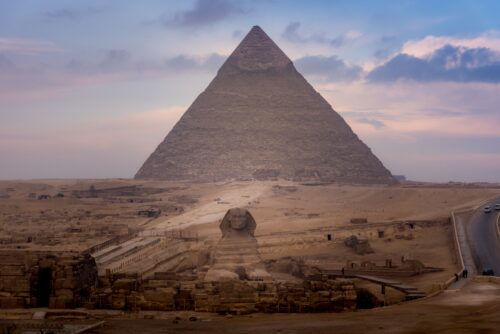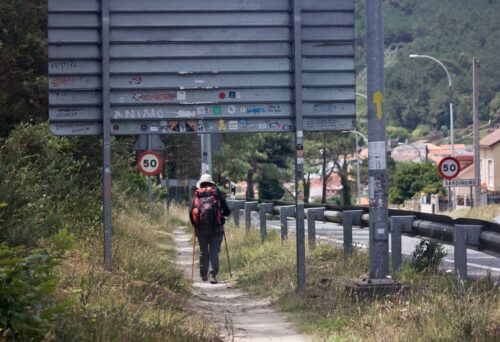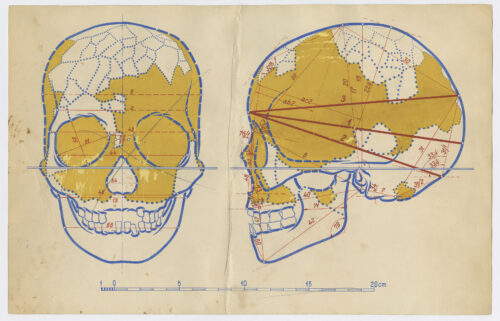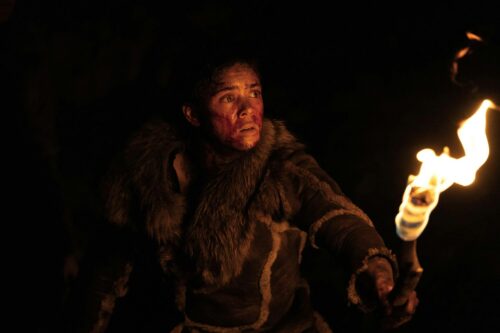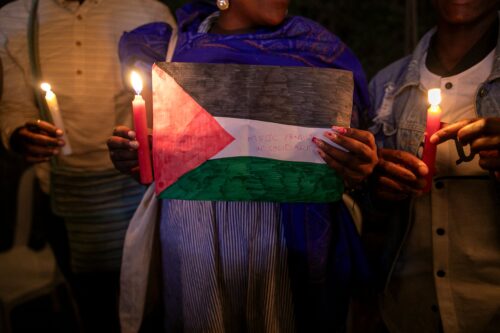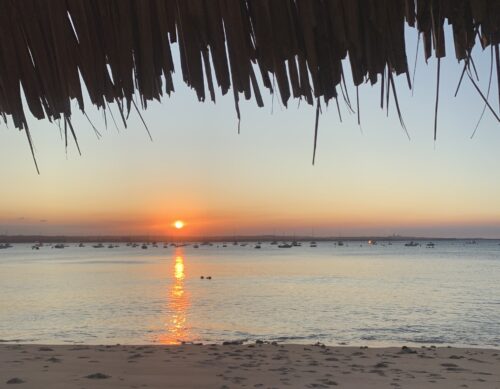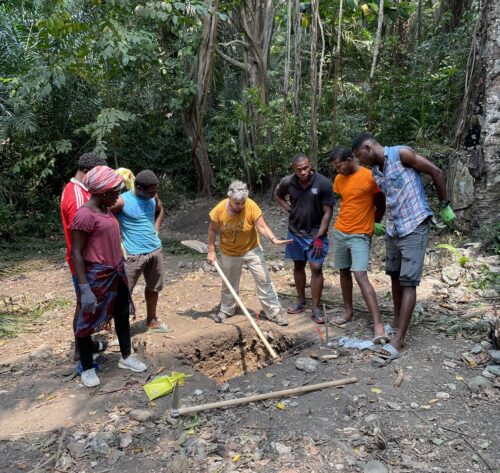When anthropologist Cathryn Townsend headed into the field in 2009 to study generosity, she knew the project was for her. She became the only person, other than anthropologist Colin Turnbull, who has lived and studied with both the Mbuti people of the Congo region and the Ik of Uganda, she says. One community was known for its egalitarianism and the other for its selfishness.
When Turnbull last visited the Ik in the 1960s, something had gone terribly wrong. He observed that the Ik were “inhuman” and “inhospitable,” and he dubbed them “the loveless people.” Tasked with studying generosity and stinginess in the Ik tribe decades later, Townsend shares her insights on how generosity is practiced when community resources are limited.
To learn more about Cathryn Townsend’s work, follow her on Twitter @CathrynTownsend.
This episode is inspired by the SAPIENS.org article “Is a More Generous Society Possible?”
Learn more about the Human Generosity Project, of which Cathryn is a part.
SAPIENS: A Podcast for Everything Human is a part of the American Anthropological Association Podcast Library.
Jen: OK, so, this time I brought you some grapes, a banana, and an apple.
Chip: Because I never eat breakfast, I take it?
Jen: No! You never eat breakfast!
Chip: Almost never. [laughs]
Jen: When we do the sound check every time, and they ask us, “What did you eat for breakfast?” You’re always like, “nothing” or “half a grapefruit.”
Chip: [laughs] So, you brought my breakfast. All right, well, would you say you’re being … generous?
Jen: Huh, I suppose so?
Chip: Hmm.
Jen: Wait. Actually, I’m not so sure.
Chip: You’re not sure?
Jen: Well, now that I’m thinking about it, what being generous means, uh, can we walk through this a little bit?
Chip: Yeah.
Jen: To me, being generous means giving you something that I think would make your life better, all the while expecting nothing in return. But, do I really expect nothing in return? Because I guess I do benefit from my generosity if it means maybe you’ll be nicer to me or maybe a little peppier for this podcast!
Chip: [laughs] So, you’re saying I’m not nice, I’m not peppy?!
Jen: No, You’re totally nice. [laughs]
Chip: I feel pretty peppy.
Jen: Or maybe I’ll feel warm feelings because I can tell myself, I’m a good person, I brought Chip breakfast. But maybe you actually don’t eat breakfast, or maybe you don’t like eating breakfast. So, is it fair to call that generosity?
Chip: Generosity is interesting and really complicated. And I know there are anthropologists around the world who are still trying to understand how it works. In fact, on SAPIENS.org, we published a piece about a researcher who’s exploring this right now. But the most fascinating part was where she went to study it.
Jen: Where’s that?
Chip: Ikland—home to a community that was said, at one time, to be the worst people on earth.
Jen: I’m Jen.
Chip: I’m Chip.
Jen: And we’re the hosts of SAPIENS: A Podcast for Everything Human.
[SAPIENS intro]
Chip: Perhaps the best place to start this story is with an anthropologist named Colin Turnbull. He was a U.S.-British national who studied at Oxford and spent a lot of time in Africa doing a lot of different things. At one point, he was hired to build the boat in the Humphrey Bogart and Katharine Hepburn film The African Queen. Once he immigrated to the U.S., he became a professor at George Washington University, a curator at the American Museum of Natural History, and, finally, a Buddhist monk ordained by the Dalai Lama himself. But what he was really known for are two books he wrote about his life with two hunter-gatherer tribes in Africa.
The first book is called The Forest People. It tells the story of the Mbuti, a tribe of hunter-gatherers who lived in the forest in what is now the Democratic Republic of Congo.
[Audio clip of a reading from the book]
Voice actor: There was something about the relationship between these simple, unaffected people and their forest home that was captivating. I was sure that I could never rest until I had come out again. … They were a people who had found in the forest something that made their life more than just worth living, something that made it, with all its hardships and problems and tragedies, a wonderful thing full of joy and happiness, and free of care.
[music]
Chip: Turnbull seemed to love the Mbuti, and it showed. He published The Forest People in 1961, and it became an instant bestseller. So, he decided to return to Africa to write another book about another tribe. They were called the Ik. The Ik were also hunter-gatherers, but they had been forced to transition from being hunters on the move to farmers who stayed put. Turnbull wanted to learn how they were adjusting.
[Audio clip of a reading from the book]
Voice actor: They were the Ik. They were not hunters. They were farmers, their mountain villages were far from livable. And the people were as unfriendly, uncharitable, inhospitable, and generally mean as any people can be. … Most lesser animals come off rather well by comparison, displaying many more of those human qualities than the Ik did. … If anything, one admires them for surviving in spite of themselves. It is rather like suddenly catching sight of oneself in middle age stripped naked in front of the bathroom mirror. … The beautiful human, like the beautiful body, seems to be a myth perpetuated by the game of self-deceit, at which humans are so singularly adept.
[music]
Chip: For a long time, these two books were taught in many introductory anthropology classes. I remember reading them in my Anthro 101 classes, and I still have them on my shelf today. But as my copies have gathered dust, they’ve also fallen out of favor across the discipline. The first because it was too romantic, and the second because it was too harsh.
In Turnbull’s obituary in The New York Times, his life is practically defined by how differently he wrote about these two groups. To him, the Mbuti were a happy, almost idyllic, society, but the Ik were heartless, loveless, the worst people on the planet. Or, in other words: A society bereft of generosity.
Cathryn: But my instinct was that Turnbull was wrong in some kind of way, and I wasn’t really sure how.
Chip: This is Cathryn Townsend. Cathryn is an anthropologist at Baylor University in Texas. She researches cooperation and trauma, and works on something called The Human Generosity Project.
Cathryn: The idea of the project was to kind of look at those different ways in which people help each other and understand them in a cross-cultural way, and what implications it has.
It started out with the Maasai, and then other societies were included, with Fijians, with Mongolians. There’s some ranchers, American ranchers, in the Malpai borderlands area. There’s also Appalachia. There’s the Hadza, who are hunter-gatherers in East Africa. So, quite a few different locations, and, you know, we’re still adding locations, actually.
Chip: The project is funded by a U.S. foundation with the hopes of understanding the role of generosity and how it is practiced in societies around the world. But, as foundation reviewers were examining the project, they found one big missing piece.
Cathryn: It was sort of suggested that perhaps this was a form of cherry-picking, actually, cherry-picking societies that were cooperative.
Chip: The project needed a new study site, and it had to be one selected for its purported lack of generosity. One community in particular came to mind.
Cathryn: The Ik had this terrible reputation due to Colin Turnbull’s book. So, they seemed like, you know, the perfect kind of counterpoint to these other societies that we were already studying.
Chip: So, Cathryn set out to go live with the Ik for an extended period of time.
[sounds of an airplane, a bush plane, and a motorbike]
Cathryn: Well, first I had to relocate to New Jersey. Then I flew back to London. From London, I flew into Uganda. Then in Kampala, I had to do things like research permission from the state of Uganda. So, I took a little bush plane, the Missionary Aviation Foundation, who I’d actually flown with before. So, I flew over to this wildlife park, and I set up a little research base there. I found a contact in Ikland, a guy called John Mark Lomeri, who has his own little grassroots organization. We spoke, and then we agreed that he was going to take me over on his motorbike to Ikland, and I could kind of see what it was like for myself, so that’s how that all worked, yeah.
Chip: Cathryn Townsend went to live with the Ik for more than a year over multiple trips. And she joins us now from a recording studio at Baylor University. Cathryn, your journey sounds totally fascinating. What was it like driving into Ikland?
Cathryn: There’s elephants and buffalo and lions. [laughs] So if the bike breaks down, you know, you’re kind of in trouble. There’s tsetse flies kind of biting you, and, yeah, it’s quite an adventure.
Chip: And what about the village. What was it like there?
Cathryn: You know, people over there, they live in little walled compounds, and they live like that because, unfortunately, they come under attack by neighboring people who do cattle raiding and so on. They live in these little walled compounds for defense. The Ik are probably among the very poorest people in the world. And they eke out a subsistence from doing very basic gardening and foraging from the environment around them in, actually, a quite limited territory. They haven’t really been noticed by the outside world because it’s this really remote area. Other communities that are better off are getting more aid work and attention from NGOs than the Ik because they’re just stuck on this mountain range and people almost forgot about them, really.
Chip: That sounds really challenging. And there you are, this outsider coming in. How do you tell the tribe what you’re doing, why you’re there?
Cathryn: It takes a little bit of explaining to go, “Well, actually, I’m here to stay, and I want to be part of your community, and will you please accept me?” So, you know, that’s a process that takes days and even weeks to sort of get over that initial sort of awkward phase.
Chip: There’s almost this deep irony with your arrival, right? You were there to study generosity because of the community’s reputation as being ungenerous, but then here you are arriving on their doorstep asking for them to accept you, and feed you, and provide you a place in the community to help you in your research. Isn’t that, like, going in with huge expectations of generosity?
Cathryn: Yeah, you’re so right. You know, I sort of took that for granted as well, which goes to show that perhaps, you know, I was never really convinced that there’s any society that could be completely as selfish as they were perhaps portrayed, even though, you know, I was a little nervous, I must admit.
Chip: Well, how were you accepted? Did they decide to work with you? I mean, given what happened with Turnbull, I could understand why they would be reluctant.
Cathryn: Well, I think people are actually quite welcoming to outsiders in that community, and it’s quite surprising, given that they’ve had an anthropologist there before. Some of them know about this that, you know, he wrote some things about them that they don’t like. Given that sometimes neighboring peoples don’t treat them so well and they get attacked by outsiders, and that they are pretty politically marginalized, that they’re actually, you know, they’re quite sort of willing to take the chance on people—on complete strangers.
Chip: Aside from them opening their doors, how do you quantify generosity?
Cathryn: So, The Human Generosity Project was formed really as the result of an anthropologist called Lee Cronk’s work with the Maasai, who are a group of herders in Kenya. And they have this kind of system of helping each other called osotua. And it’s mostly—
[music]
Chip: Essentially, Lee found that osotua is a system where each cow herder in the Maasai tribe has a partner. And if something happens to one of the herds, the partner will give up some cows to the person in need.
Cathryn: The important thing is that it isn’t a reciprocal situation in the sort of ordinary sense of that word. So, it’s not expected that that person will ever have to, and in fact it’s explicitly stated that that is not a debt, if that partner, your partner who maybe helped you in this particular instance, if that partner also runs into need, then it’s your obligation to help them so long as you can. So, it’s the sort of idea of a need-based transfer that came out of that.
Chip: In evolutionary biology, reciprocity seems at the crux of it all. But here, we have examples of people doing things in which they’re not getting anything in return, and that was fascinating.
[end music]
Chip: So, the osotua introduced this idea of need-based transfers. Was this something totally new?
Cathryn: This was a completely new way of thinking about generosity. It’s kind of building on how generosity or altruism was traditionally viewed in evolutionary anthropology, which is almost that nothing can be, like, strictly altruistic because it wouldn’t work in an evolutionary way. If you’re incurring a cost, you’re damaging your fitness outcome.
Chip: Which basically means altruism wouldn’t be a useful evolutionary trait because you are favoring the success of other people and the success of their future generations. All right, so then what?
Cathryn: That had led to this sort of idea that everything is just about reciprocity. And this was the way of going, well, actually you don’t actually always get something in return. There’s a possibility that you might, as the result of your act of generosity, but actually, you might not. And that also makes sense in an evolutionary way, and we can even have evolved a sort of psychology in which it’s emotionally satisfying to help others. Sometimes people behave generously because humans actually do find it quite emotionally satisfying to have bonds of friendship and of kinship in which you’re helping other people. That’s satisfying, and it’s also a good strategy. So, it’s a win-win situation.
Chip: And so, does something count as generous if it is self-serving, or does it have to have altruistic intent for it to be generous?
Cathryn: That’s an interesting question. I think that, normally the reason why we do things that are generous is because we feel that it’s the right thing to do and that it’s a kind of thing that makes us satisfied, psychologically. That could be an evolved capacity that we have because generosity can actually be beneficial to ourselves, ultimately. But we’re not always thinking about that. We might be genuinely, psychologically being quite selfless, actually, in thinking about the needs of that other person. And that could just be an evolved psychological capacity that we have to be generous. The fact that we even have that concept of generosity really shows that it’s something that we value as people. And I think, cross-culturally, people all have those sorts of concepts in their languages, you know, that’s a shared universal thing that we have as humans.
Chip: Wow, OK, so how do you measure that, say, with the Ik?
[music]
Cathryn: A very simple economic game. It’s a kind of experimental instrument. It’s one of the very first economic games that was ever developed in game theory by economists. It’s a really simple game. So, in a dictator game, you have a person who is described as a dictator, and they get to decide how much of an initial sum of money that’s given to them, that he or she would like to share with a second player. And then, usually, that second player is an anonymous person, and the identity of the dictator also remains concealed from everybody but the experimenter.
Chip: Is there any chance you can play the game with me?
Cathryn: Yeah, sure, but only using pretend money. [laughs]
Chip: Pretend money, OK.
Cathryn: So, let’s say that I’m going to give you $10, and you can choose how much of that you want to keep and how much of it you’ll leave for me to give to another person. Now, that person will never know your identity, and you’ll never know theirs. And you can choose to give away none of the money or some of it or all of it. So, what’s your choice?
Chip: Um, gosh. Let’s see. Yeah, I see how this goes to the heart of generosity. Um, I would give um … here’s my thinking: So, if I gave all of it away, then there’s nothing left for me. If I give, say, $7 away, then $3, that doesn’t really do a lot for me. So, then I might as well give it all away. And $10, if I keep it for myself, that could actually get me something kind of nice, uh, for my family—
Cathryn: Yeah.
Chip: Or, you know, a nice meal or something. So, I think I’ll split the difference. I think I’ll just say $5 and $5.
Cathryn: Seems fair enough to me, and I think that’s actually quite a popular decision that people do make. The most popular decision does tend to be to keep it all. And that goes for most people around the world.
OK, what if I changed it a little bit, and I said, “OK, you can choose how much of the $10 you will leave for me to give to another person who is in need. For example, they may be old and hungry.”
Chip: Mmm.
Cathryn: Would that change your decision?
Chip: Yeah, that would definitely change my thinking. If I knew how the person was gonna use it—
Cathryn: Right.
Chip: And if I knew there was someone in need, then I would, in this case, I would give all $10.
Cathryn: Mmm. Yeah, you got it. I mean, that’s typically, you know, what you see—that if you tweak the game in that way, then you see people being a little bit more generous.
Chip: OK. Very, very interesting. And so, how did the Ik do at this game?
Cathryn: I can tell you that they [are] completely normal human beings. They are within the normal range, and they do quite well at generosity. And also, when you tweak the games in various ways, it shows that they actually have cultural institutions that are geared toward generosity.
Chip: What do you mean by cultural institutions?
Cathryn: If you do what I just said and you say that the recipient is someone who, in their community, who’s old and hungry, then that increases generosity. They’ve got these spirits called the kíʝáwika, who are nature spirits, and they have this belief that the nature spirits can actually punish people who are selfish. So, if you ask them questions about the kíʝáwika, just things like, “Oh, you know, what are the kíʝáwika, and do the kíʝáwika punish people for being selfish?” If you ask them those questions, kind of priming things before you play the dictator game, then that actually brings to mind that cultural institution that they have about generosity, and that tends to actually also increase generosity in the dictator games.
Chip: I see how the game helped you quantify generosity. But leaving tests and games aside for a minute, what were your anecdotal experiences with it? Were there any moments that stand out for you?
Cathryn: So, you know, when playing economic games where you’re giving people a little bit of money, there was this one instance where there was a woman who, you know, I was playing this one game where you get a prize, and she didn’t really win the full prize that she could have won. And she’s a woman in her 40s, maybe, who has seven children, and she had one child with her, you know, one infant with her. And she was really sort of begging and desperate for, you know, this little bit of money, and she took out one of her breasts and kind of squirted her mother’s milk onto the ground to demonstrate just how watery it is and how undernourished she is, and how in need she is, really. And it made me think about, you know, these economic games. They maybe do provide a general picture overall, but sometimes when people are making decisions that might not seem that generous about how they are giving money away, because that’s typically what economic games are measuring, that sometimes that person has real reasons. That might be a person who’s really in need of help themselves, and they’re in no position to give away. So, that was a very thought-provoking moment for me. I mean, other things—just sort of realizing that some of the people who were behaving very generously are people that had life histories of facing very severe trauma in their lives, where they went through really harrowing experiences in their lives, and they perhaps had to rely on other people in their network for help. But it does seem to me that people who had life histories of having really extreme experiences were people that were actually quite tuned into the need to help others.
Chip: Do the Ik have a word for generosity in their own language?
Cathryn: They do. There’s two actually interrelated words, the one is batanon, which is more directly translatable as “generosity,” and the other one is tomor, which means “share.” So, batanon is more about a personal characteristic or way of being, and both of them kind of, when you ask people what their associations are with that term or that concept, they really emphasize it’s about giving to people who are need. If people are hungry or if people don’t have clothes or anything like that, generally, they emphasize it’s about that person’s need.
Chip: So, what big lessons did you learn after living with the Ik. What did your time there teach you?
[music]
Cathryn: I think what’s important to think about is what Turnbull got wrong, and what he seems to have gotten wrong, to me, was that he thought that this cooperative breakdown that he found among the Ik was due to their culture. So, he thought that they had this culture of selfishness that had developed because they live in an environment of scarcity. But what he seems to have missed is that there was a very, very serious famine going on. I mean, he describes that famine; he describes people dying, starving to death. And I think that if he had done what an anthropologist should really do and taken a cross-cultural perspective, that he would perhaps have been a little bit more aware that, you know, in the most severe famine circumstances, cooperation does break down. It does. And that’s a universal thing. So, we know that in famine circumstances that people do even more extreme things than what he describes of the Ik’s behavior at that time.
Chip: And so, what Turnbull really discovered was a moment of desperation. There was not a cultural phenomenon that he was witnessing. So, then, how have the Ik survived their particularly tumultuous circumstances, when they were pushed past the breaking point of starvation and survival?
Cathryn: What my research is telling me is that they’ve survived through their cultural institutions of generosity. So, culture is actually an amazing thing, and that, it equips us to cooperate in a variety of different ways, and those ways of cooperating can help to ensure our survival as a species. And culture is also remarkably resilient. So, despite what Turnbull said, the Ik already had a culture of generosity before the famine—because they have a whole language that has those concepts about being generous. And then within the space of 50 years, by the time I got there, I found a full-blown cultural tradition of helping people who are in need, and that’s obviously re-emerged from whatever social breakdown that he saw. And I know that they’ve also survived more environmental shocks since that time, including drought years, outbreaks of disease such as cholera, attacks from neighboring people. It’s a very politically unstable area. And the way that they deal with all of those things, the way they describe it is that they cooperate. They rely on each other to get through those things, those really hard times. And I think that’s what we all do as humans, really.
Chip: This conversation is making me think about the contemporary predicaments the world is facing, and maybe one of the biggest predicaments of all is our radically changing climate. If generosity helped the Ik survive, how can it help the rest of us navigate this?
Cathryn: As humans, we’ve got that capacity to cooperate and to be generous. And it’s remarkable and resilient, and we’ve got culture that is adaptable and capable of withstanding a great deal. And obviously, as a species, we’ve actually been through climate change events before, and evolutionary bottlenecks—the population of humans shrank to a very small number of people due to difficult environmental circumstances. And it seems that culture has helped us to get through, and cooperation has helped us to survive through all of those things and to colonize the entire planet. So, in some ways, that’s encouraging, but then … At the same time, we’re facing an unprecedented challenge right now, so it’s not just climate change. It’s also a loss of biodiversity, loss of topsoil, pollution of the oceans, and so on and so on. And also, it’s actually of our own making. So, in a way, it’s our very cooperation that’s actually causing the crisis. It’s a story of our success, in a way.
Chip: Mmm-hmm.
Cathryn: So, it seems that the forms of cooperation that have become dominant, which are sort of based on this exponential growth and consumption, are no longer necessarily going to be adaptive on a planet with finite resources. So, I’ve said, “the culture is resilient,” but we may actually have to use our brains—and use our very social brains—to find ways of cooperating that don’t lead necessarily to an ultimate tragedy-of-the-commons situation, where we just deplete everything, and then we all find ourselves in dire need.
Chip: And so, in the end, have you come to believe that humans are by nature generous?
Cathryn: Again, I think it comes down to, yes, we have evolved the capacity to be generous, definitely. It’s there, we can do it, and it’s helped us, I’m sure of it, in the past. But it is just a capacity—it’s not necessarily a default thing. And I think what my research is pointing to is that culture is an important element of that. And having the right cultural institutions, which also kind of get selected for, I think, through a process of cultural evolution, can ensure that way of doing things continues and that it ensures, then, the survival of the people practicing that form of cooperation. So, we’ve got to make sure that we pick the right ways of cooperating and do it at a meta-level, and realize that perhaps our survival depends on generosity and cooperation, and that we’re all really very much interdependent on this planet. And we’re not just interdependent with each other for our future survival, but we’re actually also very dependent on other living creatures, and we need to, perhaps, extend that generosity to them as well and, you know, realize that if we don’t take care of them, then they’re not gonna be there for us either in the future.
So, for me, the Ik story is a very powerful one, and actually, people should read the book. It’s an interesting book. I think it’s a deeply flawed book, The Mountain People, but he does have some insights that I think are quite interesting, you know, about what it’s like to be in an environment where the resources are completely depleted, and people can’t help each other, actually, because they’re just in such a bad shape. And do we really want to let it get that bad that we’re actually—you know, we need to find ways of cooperating before it gets to the point where we actually can’t cooperate anymore because our capacity to do so is gone.
Chip: So, do you think there’s hope for humanity?
Cathryn: There is hope for humanity, I think, yes. Definitely.
[music]
Jen: I like hope.
Chip: Hope is good, right?
Jen: And it seems that Cathryn and her colleagues are saying, basically, that societies that are more generous can actually fare better in difficult times.
Chip: And so, if that’s true, societies everywhere are facing difficult times at different points, right, so is it innate? Do all humans have this capacity for generosity? In other words, are we convinced that generosity is a human universal?
Jen: I’m not sure, but I’ll say that it seems there’s broad evidence that this is happening all over the world, even though as circumstances change, people can change, but it seems, in general, that’s what they’re finding.
Chip: Yeah, I think you’re right, and yet what I think is so fascinating is that at the same time it is this universal, there’s also these very specific cultural institutions that arise in specific places. And in the longer article on SAPIENS.org, there’s more examples, you know, from Fiji and other places. And in the U.S., the author gives an example of how in the American Southwest, ranchers will give free labor to their fellow ranchers who maybe are sick, for example, and they just call this “neighboring.” Or, you know, in Central Appalachia, in very impoverished communities, neighbors just help each other out, giving free labor without being asked at all, but it’s all culturally specific. And, you know, I can think about in my own life, for example, that I have before given food, you know, I brought over a casserole to a friend who had just had a baby, and, you know, I may never have another kid myself, but it was, you know, just wanting to help out with this friend who was in need.
Jen: Yeah. A group of us actually went over to a friend of ours’ house to help her start a garden, a really big garden.
Chip: OK, yeah.
Jen: But yeah, we just went over to help out, and I’m never gonna have a garden. [laughs]
Chip: No green thumb there? [laughs]
Jen: Nope. I had to put a face on my plant just to be happy to see it every morning and water it every day. [laughs]
Chip: Well, you’re an anthropologist, you love humans, so that makes sense. Yeah, and I think, you know, so for me, I can understand, this is where Cathryn’s optimism comes from, and this idea of hope, that maybe the real challenge here for all of us is to look for these institutions, to look for these opportunities, and really embrace them, to be more generous. So, what I’m trying to say, Jen, is thank you for bringing me breakfast. You were being generous, no question. I’m going to have a grape right now.
Jen: [laugh] I’m not so sure, because maybe you didn’t really need or want those grapes.
Chip: No, no, no, no. My dad always wanted me to have breakfast. So, he would thank you, and I’m thanking you.
[music]
Chip: This episode of SAPIENS was produced by Cat Jaffee and mixed, audio edited, and sound designed by Jason Paton. It was hosted by me, Chip Colwell.
Jen: And me, Jen Shannon.
Jen: SAPIENS is produced by House of Pod, with generous contributions from producer Paul Karolyi. Meral Agish is our fact-checker, and Matthew Taylor provided the compelling reading of Colin Turnbull’s works.
Chip: A very special thanks this time to Cathryn Townsend and The Human Generosity Project. You can find out more about both online at Humangenerosity.org. And you can read more about whether a generous society is possible at SAPIENS.org.
Jen: This is an editorially independent podcast funded by the Wenner-Gren Foundation, which has provided vital support through Danilyn Rutherford, Maugha Kenny, and its staff, board, and advisory council.
Chip: Additional support was provided by the Imago Mundi Fund at Foundation for the Carolinas. Thanks always to Amanda Mascarelli, Daniel Salas, Christine Weeber, Cay Leytham-Powell, and everyone at SAPIENS.org.
Jen: SAPIENS is part of the American Anthropological Association Podcast Library.
Chip: It’s kind of gross having to listen to someone … [chews grapes]
Jen: It’s fine!
Chip: These are good, though. Very sweet grapes. Mmm. Thank you, Jen.
